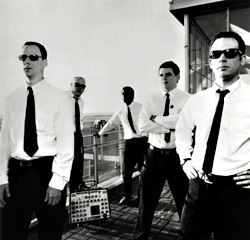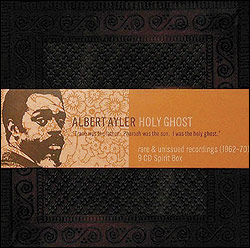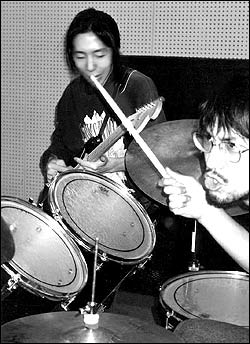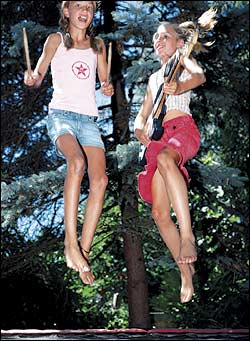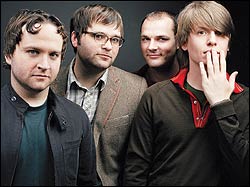The Brave and the Bold was the title of a comic book in the ’70s, teaming up Batman with a different character every issue. It’s also the title of the new album (on Overcoat) teaming up the Chicago experimental-rock group Tortoise with scraggly voiced singer Bonnie “Prince” Billy, aka Will Oldham. (Which one’s Batman?) Or maybe the team-ups are meant to be the pairing of artists and material—the repertoire here is 10 covers of not-often-covered songs.
The highlight is a version of Elton John’s “Daniel” that almost totally rubs the Elton John out of it. Tortoise’s rhythm track rolls like square wheels on a bumpy road, with a persistent squeak in the background and a droning organ coloring the rest of the arrangement; Oldham sings it through a veil of digital distortion, distractedly understating its lyrics where Elton bumps up their emotional peaks. The point of the exercise is to kidnap “Daniel” back from its context of classic-rock familiarity and brainwash it into a new identity and lifestyle.
Its neighbors are a weird bunch themselves: Bruce Springsteen’s “Thunder Road” is the best known, and Richard Thompson’s “Calvary Cross,” denuded of his guitar solos, survives surprisingly well. A lot of these songs, though, seem to have been recorded because Tortoise and Oldham liked them, rather than because they heard something useful in them. Lungfish’s “Love Is Love” and the Minutemen’s “It’s Expected I’m Gone” could really have been any source material at all, given what’s been made of them here: new songs with the same words.
Back around 1990, Tortoise’s drummer/producer John McEntire and (now ex-) bassist Bundy K. Brown were two-thirds of a headlong, cryptically brainy rock band called Bastro with guitarist David Grubbs. (Their small studio catalog is out of print for stupid legal reasons; grab Sing the Troubled Beast if you see a copy.) Bastro subsequently became Gastr Del Sol through what Grubbs calls a “unilateral disarmament”: translating their thousand-legged, hammer-hard riffs to acoustic instruments, and opening them up to what visual artists call negative space.
The final incarnation of Bastro never made a studio record—they just toured for a few months, with a new batch of songs. That material has finally surfaced on the live album Antlers (Blue Chopsticks). It’s haphazardly recorded, but it’s something of a Rosetta stone for the last 15 years’ worth of Chicago art-rock. For one thing, it’s entirely instrumental, at a moment when instrumental rock that wasn’t surf music was almost unheard of. (On the CD’s bonus live video footage, they play a couple of songs with words, too, but whenever Grubbs steps away from the microphone and starts playing one of his frantically complicated guitar parts, the whole band seems to levitate until he has to start singing again.) For another, although Bastro’s dynamics are entirely in the loud-to-really-loud range, you can hear them crushing bits of the songs open to examine what might be inside—slowing them down briefly or sketching around the fringes of chords instead of playing them outright. And McEntire, who’d become a sort of scene godfather, is starting to figure out the negative-space trick: He plays urgent hardcore rhythms, then strips them down to bare beat-keeping, and finally to punctuation for Grubbs’ and Brown’s rhythms.
The weirdest new album to have come out of roughly the same pool of circa-1991 Chicago rockers that produced Bastro and Tortoise is the National Trust‘s Kings & Queens (Thrill Jockey). It’s something like a bedroom R&B album, but not quite. Like a perfumed gift basket, it’s piled high with wicky-wicky synthesizers, smooth falsetto harmonies, and lyrics about Jacuzzis and making sweet love tonight, and bandleaders Mark Henning and Neil Rosario aren’t kidding—or, at least, they’re mostly not kidding. (“We smoke like Billy Ocean’s inside me, my Caribbean queen,” somebody purrs.)
The let’s-get-freaky-in-the-boudoir attitude feels like an outfit the National Trust have put on for the occasion—an occasion that doesn’t actually have anything to do with the boudoir. The message isn’t “Take off your clothes,” it’s “Isn’t music meant to get people to take off their clothes interesting and cool?” They’re not willing, or not able, to get as blunt and insistent as the artists they’re modeling themselves on. The hooks of actual radio R&B aren’t there, and Rosario and Henning sing like they’re providing guide vocals for a singer with more character.
Even so, the album’s amazingly entertaining—it’s almost the inverse of The Brave and the Bold, isolating a performance style Henning and Rosario love from the songs associated with it. Their arrangements are fresh and crafty, with more of an ’80s radio-R&B vibe than the lyrics’ Smoove B. gestures suggest. “Show and Tell” has a little popped-octave-bass move that’s pure 1988; “Secrets” hints at the early Cameo catalog. Arthur Russell’s attempts to bring the instrumental avant-garde to the disco floor are pretty clearly a big influence here, too—”Shapes & Sizes” lifts some of its keyboard riffs from Loose Joints’ Russell-produced 1980 single “Is It All Over My Face.” You probably shouldn’t try to make babies to Kings and Queens, but not many post-rock experiments are this much fun.
